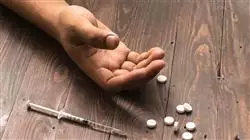University certificate
The world's largest faculty of psychology”
Introduction to the Program
This is the case of pathological gambling and addiction to new technologies, which are causing serious psychological and social health problems in both adults and young people. For these cases, psychology has also developed treatments that seek the reduction and elimination of such habits and behaviors, which we will cover in the last unit of this program”

In the 2016 World Drug Report, the United Nations Office on Drugs and Crime (UNODOC) states that 1 in 20 adults used at least one drug in 2014, that's 250 million people aged 15-64, a figure equivalent to the combined population of Germany, France, Italy and the United Kingdom. In the same report, it’s mentioned that more than 29 million people who consume drugs suffer from disorders related to them. It also states that 12 million of these are intravenous drug users, and 14% of these are living with HIV, generating a devastating impact on their health. However, only 1 in every 6 people receive treatment.
We can make an important conclusion from this: the consumption of and/or dependence on psychoactive substances is a serious problem for public health. The consumption and/or dependence on a substance leads to serious problems in the three areas in which health is understood from the biopsychosocial model: problems in the sphere of physical, psychological and social health, not only during the moment of consumption but also in the future health of the individual. Within this framework, the disciplines and professionals concerned with the health of the population, including psychology professionals, are developing treatments and care protocols aimed at intervening effectively in addictive disorders. The scale of this problem requires professionals to be trained in the management of this particular field of intervention.
In recent decades, those addictions where there is no substance that produces dependence, but rather a habit or behavior have also been added to list of addictions which require treatment. This is the case of pathological gambling and addiction to new technologies, which are causing serious psychological and social health problems in both adults and young people. For these cases, psychology has also developed treatments that seek the reduction and elimination of such habits and behaviors, which we will cover in the last unit of this program.
Expand your knowledge through the Postgraduate certificate in Cognitive-Behavioral Intervention in Psychostimulant Addiction, in a practical way and adapted to your needs”
This Postgraduate certificate in Cognitive-Behavioral Intervention in Psychostimulant Addiction contains the most complete and up-to-date program on the market. The most important features include:
- Clinical cases presented by experts in psychology
- The graphic, schematic, and practical contents with which they are created provide scientific and practical information on the disciplines that are essential for professional practice
- Diagnostic and therapeutic developments in Cognitive-Behavioral Intervention in Psychostimulant Addiction
- An algorithm-based interactive learning system for decision-making in the clinical situations presented throughout the course
- With special emphasis on evidence-based psychology and research methodologies in psychology
- All of this will be complemented by theoretical lessons, questions to the expert, debate forums on controversial topics, and individual reflection assignments
- Availability of content from any fixed or portable device with internet connection
This Postgraduate certificate is the best investment you can make when choosing a refresher program, for two reasons: in addition to updating your knowledge in Cognitive-Behavioral Intervention in Psychostimulant Addiction, you will obtain a qualification from TECH"
It includes in its teaching staff health professionals belonging to the field of Cognitive-Behavioral Intervention in Psychostimulant Addiction, who pour into this program the experience of their work, in addition to recognized specialists belonging to scientific societies of reference.
Thanks to its multimedia content developed with the latest educational technology, it will allow the professional a situated and contextual learning, that is to say, a simulated environment that will provide an immersive learning programmed to train in real situations.
This program is designed around Problem-Based Learning, whereby the physician must try to solve the different professional practice situations that arise throughout the program. For this, the student will be assisted by Cognitive-Behavioral Intervention in Psychostimulant Addiction and extensive teaching experience.
Make the most of the opportunity to update your knowledge in Cognitive-Behavioral Intervention in Psychostimulant Addiction using classical methods to improve your patient care"

The Postgraduate certificate includes real clinical cases and exercises to bring the program closer to the clinical practice of psychologists"
Why study at TECH?
TECH is the world’s largest online university. With an impressive catalog of more than 14,000 university programs available in 11 languages, it is positioned as a leader in employability, with a 99% job placement rate. In addition, it relies on an enormous faculty of more than 6,000 professors of the highest international renown.

Study at the world's largest online university and guarantee your professional success. The future starts at TECH”
The world’s best online university according to FORBES
The prestigious Forbes magazine, specialized in business and finance, has highlighted TECH as “the world's best online university” This is what they have recently stated in an article in their digital edition in which they echo the success story of this institution, “thanks to the academic offer it provides, the selection of its teaching staff, and an innovative learning method aimed at educating the professionals of the future”
A revolutionary study method, a cutting-edge faculty and a practical focus: the key to TECH's success.
The most complete study plans on the university scene
TECH offers the most complete study plans on the university scene, with syllabuses that cover fundamental concepts and, at the same time, the main scientific advances in their specific scientific areas. In addition, these programs are continuously being updated to guarantee students the academic vanguard and the most in-demand professional skills. In this way, the university's qualifications provide its graduates with a significant advantage to propel their careers to success.
TECH offers the most comprehensive and intensive study plans on the current university scene.
A world-class teaching staff
TECH's teaching staff is made up of more than 6,000 professors with the highest international recognition. Professors, researchers and top executives of multinational companies, including Isaiah Covington, performance coach of the Boston Celtics; Magda Romanska, principal investigator at Harvard MetaLAB; Ignacio Wistumba, chairman of the department of translational molecular pathology at MD Anderson Cancer Center; and D.W. Pine, creative director of TIME magazine, among others.
Internationally renowned experts, specialized in different branches of Health, Technology, Communication and Business, form part of the TECH faculty.
A unique learning method
TECH is the first university to use Relearning in all its programs. It is the best online learning methodology, accredited with international teaching quality certifications, provided by prestigious educational agencies. In addition, this disruptive educational model is complemented with the “Case Method”, thereby setting up a unique online teaching strategy. Innovative teaching resources are also implemented, including detailed videos, infographics and interactive summaries.
TECH combines Relearning and the Case Method in all its university programs to guarantee excellent theoretical and practical learning, studying whenever and wherever you want.
The world's largest online university
TECH is the world’s largest online university. We are the largest educational institution, with the best and widest online educational catalog, one hundred percent online and covering the vast majority of areas of knowledge. We offer a large selection of our own degrees and accredited online undergraduate and postgraduate degrees. In total, more than 14,000 university degrees, in eleven different languages, make us the largest educational largest in the world.
TECH has the world's most extensive catalog of academic and official programs, available in more than 11 languages.
Google Premier Partner
The American technology giant has awarded TECH the Google Google Premier Partner badge. This award, which is only available to 3% of the world's companies, highlights the efficient, flexible and tailored experience that this university provides to students. The recognition as a Google Premier Partner not only accredits the maximum rigor, performance and investment in TECH's digital infrastructures, but also places this university as one of the world's leading technology companies.
Google has positioned TECH in the top 3% of the world's most important technology companies by awarding it its Google Premier Partner badge.
The official online university of the NBA
TECH is the official online university of the NBA. Thanks to our agreement with the biggest league in basketball, we offer our students exclusive university programs, as well as a wide variety of educational resources focused on the business of the league and other areas of the sports industry. Each program is made up of a uniquely designed syllabus and features exceptional guest hosts: professionals with a distinguished sports background who will offer their expertise on the most relevant topics.
TECH has been selected by the NBA, the world's top basketball league, as its official online university.
The top-rated university by its students
Students have positioned TECH as the world's top-rated university on the main review websites, with a highest rating of 4.9 out of 5, obtained from more than 1,000 reviews. These results consolidate TECH as the benchmark university institution at an international level, reflecting the excellence and positive impact of its educational model.” reflecting the excellence and positive impact of its educational model.”
TECH is the world’s top-rated university by its students.
Leaders in employability
TECH has managed to become the leading university in employability. 99% of its students obtain jobs in the academic field they have studied, within one year of completing any of the university's programs. A similar number achieve immediate career enhancement. All this thanks to a study methodology that bases its effectiveness on the acquisition of practical skills, which are absolutely necessary for professional development.
99% of TECH graduates find a job within a year of completing their studies.
Postgraduate Certificate in Cognitive-Behavioral Intervention of Psychostimulant Addiction
Addiction to psychostimulants is a problem that is affecting an increasing number of people. Due to the lack of effective treatments for this problem, it is essential that health professionals are trained to intervene in the prevention, detection and treatment of this addiction. For this reason, at TECH Global University we have created the Postgraduate Certificate in Cognitive-Behavioral Intervention of Psychostimulant Addiction, an online program focused on instructing professionals in the best practices to treat this problem. In this Postgraduate Diploma you will find the best educational tools of the moment, which will turn you into a Postgraduate Diploma of high prestige. Here, we have the best online methodology, through which you will be able to combine your learning with other personal or work activities. In addition, we subject academic excellence to the current corporate approach, therefore, you will have at your fingertips an unbeatable offer, at the reach of a click.
Get trained in treating addiction to psychostimulants
This TECH Postgraduate Certificate offers you the opportunity to train yourself to treat addiction to psychostimulants effectively. This online program will allow you to acquire the necessary skills and competencies to carry out an adequate intervention in the prevention, detection and treatment of this problem. As you progress through the curriculum, you will delve into cognitive-behavioral intervention, one of the most effective therapies for the treatment of psychostimulant addiction. Through this therapeutic approach, you will help patients identify and modify the patterns of thinking and behavior that lead them to use drugs. You will also learn the latest research and techniques for treating psychostimulant addiction, which will allow you to be at the forefront in the treatment of this problem. Upon completion of the training, you will be a Postgraduate Diploma in intervening in the prevention, detection and treatment of psychostimulant addiction.







